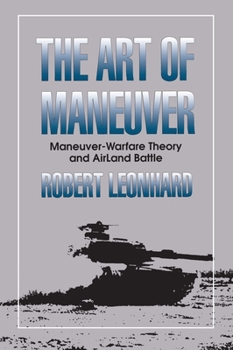The Art of Maneuver: Maneuver Warfare Theory and Airland Battle
(Part of the Riigikaitse raamatukogu Series)
Select Format
Select Condition 
Book Overview
The Art of Maneuver is an important theoretical study of an issue that is currently the subject of much discussion in professional military journals and symposia. This description may be from another edition of this product.
Format:Paperback
Language:English
ISBN:0891415327
ISBN13:9780891415329
Release Date:June 1994
Publisher:Presidio Press
Length:336 Pages
Weight:1.05 lbs.
Dimensions:0.7" x 6.0" x 8.9"
Customer Reviews
5 ratings
An excellent work.
Published by Thriftbooks.com User , 22 years ago
The Art of Maneuver is an excellent work from the commander that we "well trained platoon leaders" affectionately referred to as "The Professor." This book is as timely now as when it was first published. If we try to gauge our success in Afghanistan (or any war) by counting body bags, we will be doomed to repeat our own history. Instead we must, as Leonhard teaches us, keep the enemy dislocated and operate inside his decision cycle. Excellent advise for officers of today and of the future from a seasoned officer who has studied his craft well.
Outstanding contribution to military theory
Published by Thriftbooks.com User , 23 years ago
As a non-military person I approached this work with some trepidation, but within pages my fears were erased. This is a superbly written, well thought out book. Leonhard offers, step by step, the history of "maneuver" warfare, and explains how it has been ill applied in American arms. He goes on to provide a doctrine for it's application, and finally critiques the Army's performance in Panama and the Persian Gulf.Leonhard's tactical sense is above reproach, and his explanations are offered in cogent, brief passages. This work is unique in my experience with military theory in that it is both easy to read, and important. Any serious student of military theory/history would do well to read this book to better understand both the past, and the future.Oh, and if you pay careful attention, it just might improve your chess game as well...it did mine!
Enlightening, Educational and a bloody good read.
Published by Thriftbooks.com User , 24 years ago
Instructors at various training institutions have been trying to educate me in the aspects of "Manouevre Warfare" for nearly ten years now, but it wasn't until I read this book that I began to understand it. The concepts and techniques that Mr Leonhard is trying to get across aren't new or original, as he implicitly states, but the genius he shows is in explaining it all so clearly and then applying it to modern situations. The style of writing was very easy to follow, and the book was, in the main, a joy to read. The more I read, the more the lights came on in my head. While I couldn't say that I am now an expert on this approach to war (or even competent at it), understanding the principles behind it means I can begin to apply and practise them. This book is ideal reading for anyone in the senior lieutenant level, as a primer for the junior staff course(s) in your Army (Although instructors tend to preach manouvre and then practice attrition, it will still help you). It should be required reading for all officers who take their calling seriously, regardless of Corps. If nothing else, it will encourage debate, and that is always a healthy and desirable thing.Highly recommended. I'm only sorry I can't get my own copy.
If maneouvre strategy is new for you, this is a good book
Published by Thriftbooks.com User , 26 years ago
If you are new to maneouvre warfare this is a good starting point. Leonhard synthesises thought and doctrine without making it a result of his personal experience solely - but his personal experience lends caution and credence to the points he raises. I found the book generated an interest to follow up on some of the other authors he mentioned, the historical basis of maneouvre (Napoleon etc). There is not too much jargon and no painful acronyms that stop you in full reading flow. I wish he had addressed more the differences between light infantry and dismounted infantry - a distinction not made often enough.
A detailed and readable study of maneuver in warfare
Published by Thriftbooks.com User , 26 years ago
Leonhard discusses the art of neutralizing your opponent's strengths in detail, with numerous examples and analyses. He discusses three main techniques. Preemption is acting before your opponent expects an attack, catching him by surprise. Dislocation is acting in a way to avoid the enemy's strength, such as David attacking Goliath from out of Goliath's reach. Disruption is finding some critical enemy weakness, such as communications, or some position or assumption that supports morale, and attacking it fiercely. Leonhard explains these clearly and with plenty of examples. Leonhard also provides numerous examples of what not to do, with detailed discussion of why such things are bad ideas. He strongly discourages attrition warfare, since it means we have to be superior in raw strength to prevail in a battle that will be bloody for both sides. He shows why not to engage the enemy when possible, and demonstrates how to seize opportunities to neutralize enemy forces without having to fight them. Most of his bad examples come from current U.S. Army thinking, although some of his good examples come from U.S. Army practice. This is not only a clear discussion of the practice of maneuver in warfare, but a spirited analysis of modern Army doctrine from a firm and understandable viewpoint. The main failing of the book is Leonhard's insistence that maneuver is always the answer, and attrition never is, and his disregard of the dangers of maneuver. It is therefore not suitable as the first, or only, book to read about strategy. It makes an excellent second book, as it is a clear and compelling exposition of military maneuver.




